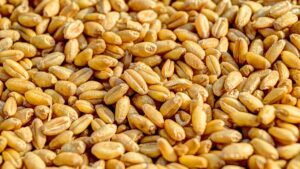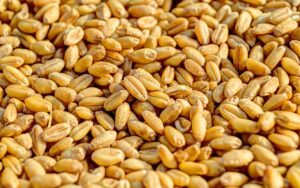
Ukraine will temporarily refrain from exporting grain and sunflower to Poland until the new season in order to solve the problem of overstocking the Polish market and protests of Polish farmers, the Polish Ministry of Agriculture and Rural Development reported, citing Ukrainian Minister of Agricultural Policy and Food Nicholas Solski.
“We all understand who is to blame for this situation, but we must solve the problem. Therefore, Ukraine will refrain from exporting wheat, corn, rapeseed and sunflowers to Poland (until the new season),” the Polish agency quoted Solsky from a joint press conference on Friday with his Polish colleague Robert Telus at the border with Ukraine in Dorohusk.
“The Ukrainian side made a proposal to very much limit for some time, and at the moment even stop the flow of grain to Poland,” Telus said, in turn.
As reported, April 5, Ukrainian President Vladimir Zelensky at a meeting with Polish Prime Minister Mateusz Morawiecki in Warsaw said that the parties have found a way out of the problem of Ukrainian grain exports to Poland.
“We discussed the issues of our farmers – Polish and Ukrainian. We have found a way out. I believe that in the coming days, weeks we will finally solve all the issues, because there cannot be any difficulties between such close partners and real friends as Poland and Ukraine,” Zelenski said.
Earlier, the governments of Poland and Romania announced their intention to ask the European Commission to develop mechanisms that would help avoid price dumping to the detriment of local farmers.
Polish farmers threatened to disrupt the events during Zelenski’s visit to Warsaw, and Polish Minister of Agricultural Policy Henryk Kowalczyk resigned.
If the international community had been able to “push” Russia to increase ship inspections in the Bosporus, Ukraine would have been able to reduce the flow of grain traffic through European countries, Solsky said then, in turn.

Leaders of five Central and Eastern European countries have urged the European Commission to take action in connection with a surplus of grain and other Ukrainian food on their territory, the Associated Press reported from Warsaw.
“We call on the European Commission to study the possibility of buying accumulated grain from EU member states bordering Ukraine for humanitarian needs,” reads a letter addressed to EC President Ursula von der Leyen on behalf of the prime ministers of Poland, Slovakia, Hungary, Romania and Bulgaria.
“We also reiterate our call for financial support from the EU to accelerate the development of transport infrastructure (for the export of grain – IF),” it says.
It is pointed out that such products remain on the shelves of these countries in excess, reducing prices, and do not reach the countries that are ready to buy them outside the EU.
The European Commission earlier said that it intended to quickly launch an assistance mechanism for countries that faced an influx of Ukrainian products.

The U.S. Agency for International Development (USAID) announced collaboration with three major Ukrainian agricultural holdings to develop their grain export and storage infrastructure for a total project investment of $44 million.
According to CNN’s website, the three companies are large Ukrainian agricultural producers Kernel, Nibulon and Grain Alliance.
It is specified that the cooperation with the companies will help increase Ukraine’s capacity to ship over 3 million tons of grain to foreign markets per year. Investments will be used to develop the infrastructure of agricultural products storage and expansion of elevators.
“This announcement is part of a deliberate effort by the Biden administration to develop Ukraine’s economy and mitigate the global food security crisis that escalated after Russia’s invasion of Ukraine,” the publication specified in the report.
As earlier reported, before the war Kernel was the world’s number one producer and exporter of sunflower oil (about 7% of world production) and was the largest producer and seller of bottled sunflower oil in Ukraine. The company was also engaged in cultivation and sale of other agricultural products.
In FY2022 (July-2021 – June-2022), the holding posted a net loss of $41 mln versus $506 mln net profit in the previous FY. Its revenue decreased by 5% to $5.332 bln, and EBITDA decreased by 3.7 times to $220 mln.
Nibulon, one of the largest grain market operators in Ukraine, on April 15, 2022 received the permit from Izmail city council (Odessa region) for the construction of the terminal for handling grain cargoes on the land plot with the total area of 20 hectares.
“Nibulon” was established in 1991. Before Russian military invasion grain trader had 27 transshipment terminals and complexes to receive the crops, the capacities for one-time storage of 2,25 mln. tons of agroindustrial complex products, fleet of 83 vessels (including 23 tugs), and also owned Nikolaev shipyard.
“Nibulon” before the war worked 82 thousand hectares of land in 12 regions of Ukraine and exported agricultural products to more than 70 countries.
The grain trader exported maximum 5.64 million tons of agricultural products in 2021, reaching record volumes of deliveries to foreign markets in August – 0.7 million tons, the fourth quarter – 1.88 million tons and in the second half of the year – 3.71 million tons.
Grain Alliance Agro Holding in spring 2022 purchased a grain logistics hub near the border of Ukraine and Slovakia to deliver agricultural products by land bypassing Ukrainian ports, the throughput capacity of which was significantly reduced due to the full-scale Russian military invasion. The transshipment capacity of the grain terminal in Černá nad Tysou (Slovakia) will be up to 400,000 tons per year.
Before the war, Grain Alliance farmed 57,000 hectares in Kyiv, Poltava, Chernigov and Cherkassy regions, grew more than 300,000 tons of grains and oilseeds a year, and owned more than a thousand head of cattle.
Agroholding has six granaries in Ukraine with a total capacity of over 260 thousand tons.
The founders of Harvest Moon East LLC (Baryshevka village, Kyiv region) and BZK Grain Alliance (Sweden) established a joint company, Grain Alliance, in 2009.

The Romanian government in cooperation with Moldovan authorities will build a pontoon bridge across the Prut border river to improve the transportation of cargo from Ukraine, mainly grain, according to the website of Polish publication Gospodarka Morska, citing Irinel Scriosteanu, state secretary of the Romanian Transport Ministry.
According to Romanian official, the new pontoon crossing will be built at the place where until 1944 there was a bridge between Bumbata village (Bumbata, Romania) and Leova city (Leova, Moldova), later destroyed by Soviet Red Army troops.
Scriosteanu said the pontoon bridge would be used for both passenger and freight traffic.
“In recent months, the Romanian and Moldovan governments have announced a number of logistics projects to improve the transportation of goods from Ukraine, especially grain. Because of the Russian invasion of Ukraine, the Romanian port of Constanta is important for the shipment of grain from this country through the Black Sea,” the Polish edition concluded.
As reported, Romania became the largest importer of Ukrainian grain crops in 2022 because of the Russian aggression, although in 2021 it was not even in the top 20 importers. Its share was 13.6% of the total value of Ukrainian supplies of this commodity group abroad. During the year, this country increased the volume of imports from Ukriane by 690 times compared to 2021 – up to $1.24 billion from $1.8 million.

Ukraine since the beginning of 2022/2023 marketing year (MY, July-June) and until February 27 has exported 31.78 million tons of grain crops, including 18.2 million tons of corn (57.2% of total supplies), 11.24 million tons of wheat (35.6%) and 2.05 million tons of barley (6.4%).
As reported on the website of the Ministry of Agrarian Policy and Food on Monday, the rate of grain exports since the beginning of this MY is by 26.9% lower than during the same period of the previous MY, when 43.52 million tons were shipped abroad on that date. Thus, on February 27, there was achieved the minimum for the season lag of export volumes from the indicators of the previous season. For comparison, the previous smallest gap from last year’s figures at the rate of “minus” 28.65% was recorded on February 13.
According to the Ministry, Ukraine has exported 18.2 million tons of corn (-5.8% compared to the same period last year), 11.24 million tons of wheat (1.61 times less), 2.05 million tons of barley (2.75 times less), 15.8 thousand tons of rye (10.2 times less) and 97.7 tons of flour (+43.7%) since the beginning of 2022/2023 MY and until February 27 this year.
It is specified that Ukraine exported 4.7 million tons of grain since early February, including 2.94 million tons of corn, 1.51 million tons of wheat, 229 tons of barley, 15,300 tons of flour and 3 tons of rye.
As it follows from the Ministry data, during the week of February 20-27, an average of 192.9 thousand tons of grain was supplied to foreign markets per day, while during the preceding period of February 13-20 – 165.7 thousand tons/day, February 3-13 – 170.7 thousand tons/day, January 27 – February 3 – 209.4 thousand tons/day, January 20-27 – 121.1 thousand tons/day, January 9-20 – 140 thousand tons/day and January 2-9 – 121.7 thousand tons/day. Thus, the average daily rate of exports during the reporting period February 20-27 has increased by 16.4% compared to the previous period February 13-20.
As reported, Ukraine in 2021/2022 MY exported 48.51 million tons of grain and leguminous crops, which is 8.4% higher than in the previous MY, despite the full-scale invasion of Russia and the difficulties with the export of agricultural products due to the blockade of Ukrainian seaports. 18.74 million tons of wheat (12.6% more than in 2020/2021MY), 23.54 million tons of corn (+1.9%), 5.75 million tons of barley (+35.9%), 70.9 thousand tons of flour (-44.1%) were supplied to foreign markets.
Ukraine in 2020/2021 MY exported 44.72 million tons of grain and leguminous crops: 16.64 million tons of wheat, 23.08 million tons of corn, 4.23 million tons of barley, 126.9 thousand tons of flour and 18.4 thousand tons of rye.
In 2019/2020, Ukraine exported 56.72 million tons of grain and leguminous crops.

During the last week, the daily volume of grain export by rail decreased by 2-3 thousand tons per day on average – down to 108 thousand tons per day because of artificial delays in the registration of vessels by Russian representatives in inspection groups under the Joint Coordination Center in Istanbul and reducing the effectiveness of the “grain corridor”, said Valery Tkachev, Deputy Director of the department of commercial work UZ at a meeting with market participants on Thursday.
“If we compare the current daily average with a week ago, we can state a slight decrease in the average daily volume of grain transportation in the export direction: today we carry an average of 108 thousand tons per day, while a week ago – 110 thousand tons, mainly due to lower traffic volumes to sea ports,” – said Tkachev.
At the same time, he said, the volume of grain transportation in the direction of overland railroad crossings has increased on average by 1 thousand tons per day – up to almost 34 thousand tons per day.
In February (February 22) UZ already transported 2.37 million tons of grain for export.
Earlier Yuri Vaskov, deputy minister of reconstruction, said on Aljazeera English live broadcast that since October the efficiency of the “grain corridor” does not exceed 40% of the available export capacities.
On February 15, Ukraine issued a statement calling on the international community, particularly the United Nations and Turkey, as guarantors of the Black Sea Grain Initiative, to demand that Russia immediately stop its artificial delays and unblock commercial shipping to Ukrainian Black Sea ports.
The Ukrainian side notes that Russian representatives in the inspection teams under the Joint Coordination Centre in Istanbul have been systematically delaying for several months in a row the inspection of vessels transiting the Bosporus Strait to/from Ukrainian ports. Every day less than half of the planned 10 inspections usually take place. As a result, in the last three months alone the world was short 10 million tons of Ukrainian food, and the queue of ships waiting for inspection in the Bosporus exceeded 140 units.
Representatives of Ukraine noted that at the same time, Russia enjoys the opportunity of unimpeded commercial shipping from Russian Black Sea ports: the volume of traffic through Russian seaports in the Azov-Black Sea basin in 2022 was more than 250 million tons, which exceeded the figures in 2021.